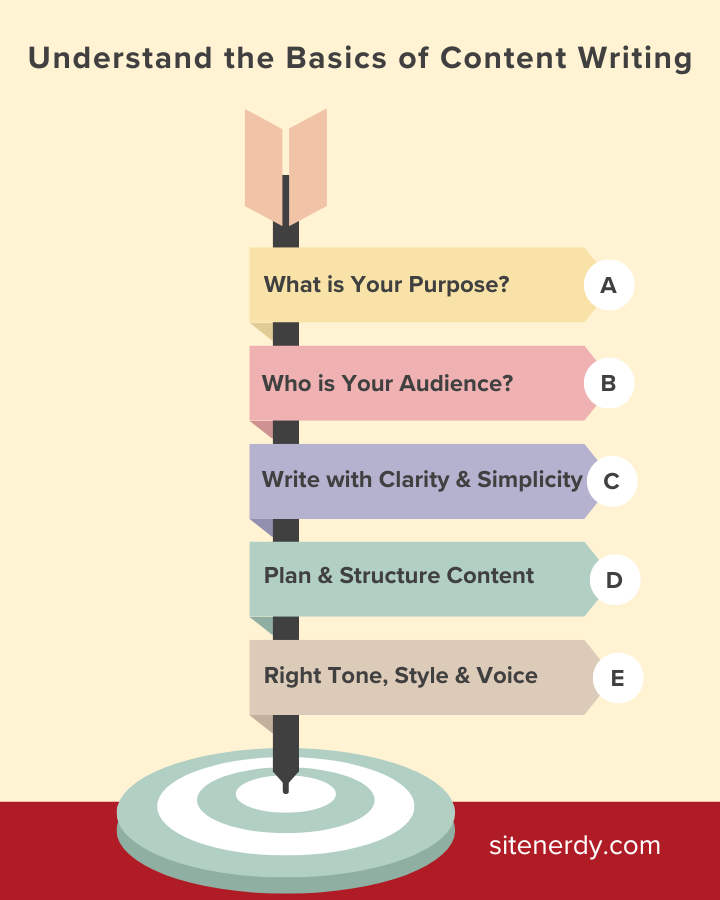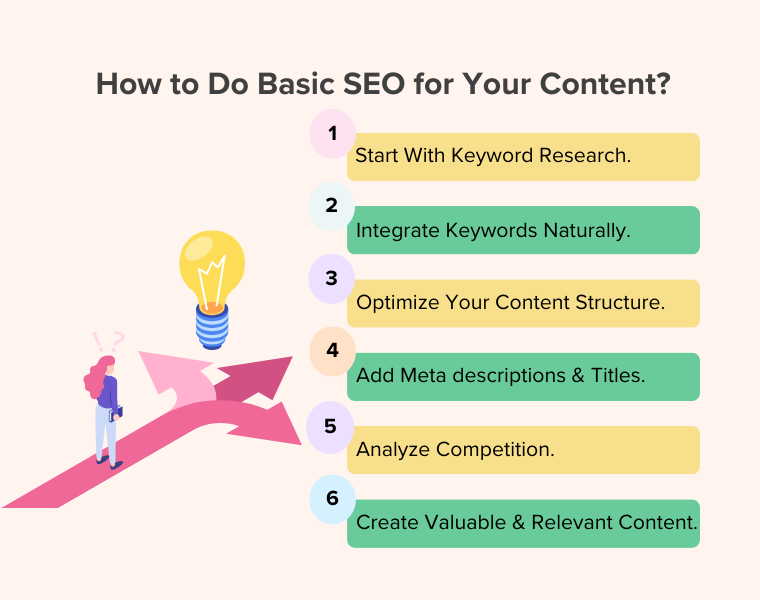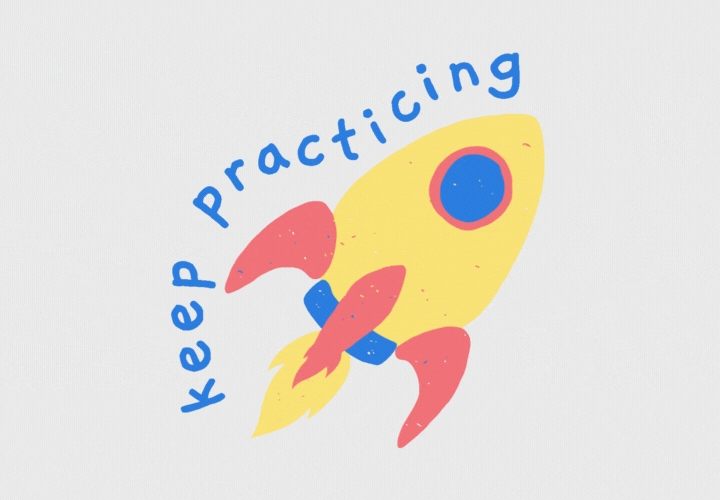
Have you ever wondered how to become a content writer?
Maybe your friends and family ask you to write a message or post because you have a way with your words. If you love to write and show people ideas in a clear, creative way, then content writing may be just the right path for you.
In today’s digital world, content is everywhere, whether it’s for businesses, social media, or marketing.
That’s why good content writers are always in demand.
If you feel that you can turn ideas into engaging, easy-to-understand content, then you’re already on the right track.
But are you overwhelmed by how and where to start? Fear not!
In this article, we’ll walk you through all the steps you need to take to become a skilled content writer.
So, tighten your seatbelt as we ride you through!
What is Content?
Before we move forward, let’s understand what exactly is content.
Well, in simple words, content refers to any information or material presented to an audience.
It can take various forms such as text, images, videos, podcasts, infographics, or social media posts.

For instance, this piece of article that you’re reading right now is one form of content.
The primary goal of the content is to inform, engage, entertain, or persuade its intended audience.
According to the Content Marketing Institute, 90% of B2B marketers use social media to distribute content, and 79% use blogs.

In fact, today content plays a subtle yet significant role in building connections between brands and their audience.
Who is a Content Writer?
So, who exactly is responsible for creating all this content? Well, a content writer, of course.

If we have to define it, then a content writer is a professional who specializes in producing well-crafted, engaging written material for various platforms.
Whether it’s for a blog post, an article, a social media update, or an email campaign, a content writer tailors their message to fit the audience’s needs precisely.
But, what makes a good content writer?
Without a doubt, strong writing skills, an understanding of the audience, and an ability to give the exact information that the audience is looking for in a digestible way.
What is Content Writing?
Now, you might ask yourself, ‘What does content writing really involve?’

To be precise, content writing is the process of researching, drafting, and editing written material designed to serve a specific and stated purpose.
It goes beyond just writing articles.
According to AIMultiple, 75% of large companies outsource content writers, showing how crucial quality writing is to business. Additionally, it also notes 60% of marketers prioritize content creation.Crafting product descriptions and landing pages to composing email newsletters and social media posts, all of it fall under the content writing domain.
Exploring the Role of Content Writer in the Digital Space
The responsibilities of a content writer go far beyond just writing.
You can have a quick rundown of what makes a content writer’s role so essential in digital space.
- Content writers are essential to a brand’s online presence.
- They don’t just write but also optimize content for search engines (SEO).
- They adapt content to suit different platforms such as blogs, social media, and websites.
- Content writers align their work with broader digital marketing strategies.
- They help businesses stand out in a competitive online environment.
- Skilled content writers engage the target audience effectively.
- Without them, brands may struggle to stay relevant and connect with their audience.
Summing up, we can say that content writers are strategic communicators who craft content that resonates with the audience and aligns with brand goals.
Step-by-Step Roadmap to Becoming a Skilled Content Writer
Becoming a skilled content writer requires more than just a love for words. It takes strategy, understanding, and a structured approach.
Whether you’re new to writing or looking to sharpen your skills, following a clear roadmap will guide you to success.
So, here we present to you a step-by-step roadmap to becoming a skilled content writer. Let’s go!
Step 1: Understand the Basics of Content Writing
Before you start writing your first word, you need to get the basics right. For that, you need to understand the following subtle yet crucial aspects.

A) What is Your Purpose?
Always ask yourself, what am I trying to achieve? Is your goal to inform, entertain, or persuade?
Knowing this helps you shape your content’s tone and direction. So, when the purpose is clear, your writing stays focused and effective.
B) Who is Your Audience?
Who are you writing for? Are they beginners or experts? What do they care about?
Then, accordingly, you need to tailor your language and content to match their needs.
This is important because if you don’t know your audience, then your message may miss the mark.
C) Write with Clarity & Simplicity
Good content is easy to read and understand. You need to avoid complicated words or long sentences. The mantra is to break ideas into digestible parts.
Time and again ask yourself, Can my reader easily follow what I’m saying? If not, then simplify.
D) Plan & Structure Your Content
Good content starts with a plan or an outline. Planning helps you stay focused, organize your thoughts, and ensure you don’t go off-track.
Once you have a solid plan, structure your content to keep the readers engaged. Just like how you followed the introduction of this article to this section.
You can start with an introduction that grabs attention and also keeps your readers hooked. Then, organize the body into clear sections. And finally, end with a conclusion or a clear call to action.
E) Use the Right Tone, Style & Voice
How do you want your audience to feel when they read your content?
Should it sound professional, casual, or conversational? Now, once you get the answers, you need to choose a tone that matches the topic and audience.
If you’re writing about a serious subject, stay formal. For a blog post, a friendly tone works better.
Once you determine the tone, maintain a consistent voice throughout your content. Your voice is how your content ‘sounds’ to the reader.
So, your foundation or roots are set correctly and you’re well on your way to becoming a skilled content writer.
Step 2: Strengthen Your Writing Skills
Now that you understand the basics, it’s time to sharpen your writing skills.
Writing well takes practice and attention to detail.
Here, we’ve listed some of the simple yet effective ways to strengthen your writing abilities:
- Consistency is key, and the mantra is to write every day. You can even set time daily to write and gradually improve your skills.
- Read often and notice how other writers structure and develop their ideas. Learn from them.
- Improve your vocabulary by learning new words and using the words that you already know but barely use. However, ensure simplicity to make your message clear.
- Good grammar builds credibility. Review rules and adapt your style to each platform. You can use tools like Grammarly to improve your grammar.
- Experiment with different types of writing such as free writing, technical writing, etc to see what suits you best. So you become more versatile and adaptable.
- Ask for feedback from others. Constructive criticism helps you identify areas for improvement.
- Writing is about rewriting. And first drafts are rarely perfect. So, review, cut unnecessary words, and refine your content for clarity.
By strengthening your writing skills, you’ll develop the foundation needed for creating impactful content.
But strong writing alone isn’t enough—you also need to back it up with solid research which takes you to our next step.
Step 3: Learn the Art of Research
Good content is built on accurate and well-researched information. Therefore, to create valuable content, you must become skilled in research.
So, what exactly is research? Well, research simply means searching again and again until you find the right information that serves your purpose.

This is to say that before writing, you need to understand your topic deeply. Don’t just skim the surface. Rather, immerse yourself in the subject until you can explain it clearly.
In fact, when you keep your research organized, you find key details quickly when writing.
On top of that, what’s important is you need to make sure that your content information is current.
For that, regularly update your written content with well-researched latest trends and developments.
Step 4: Learn SEO Basics
To succeed as a content writer in the digital space, understanding SEO (Search Engine Optimization) is super important.
Basically, SEO helps your content rank higher in search engines. As a result, it’s more visible to your target audience.

Here’s how you can do basic SEO right by yourself.
Start with keyword research.
Keywords are the phrases people use to search for information online. Tools like Google Keyword Planner or Ubersuggest help you find relevant keywords. Then, you need to focus on terms that match your content and audience needs.
Next, integrate keywords naturally into your writing.
You can use them in your title, headings, and throughout the content, but don’t overstuff. Ask yourself, “Does this flow naturally?” However, note that forced keywords can harm readability and SEO.
Optimize your content structure for both readers and search engines.
Remember to break up your text with headings, subheadings, and bullet points. These elements make your content easier to read and improve your ranking.
Don’t forget meta descriptions and titles.
Meta descriptions are brief summaries of your content that appear in search results. So, you need to write a compelling description that includes your main keyword to encourage clicks.
Finally, focus on creating valuable, relevant content.
Search engines prioritize high-quality, user-focused content. This is to say that the better your content serves the reader’s needs, the higher it’s likely to rank.
Do you want to learn more about SEO? Then, check out our comprehensive article on what is SEO for more insights.
Step 5: Create a Consistent Writing Routine
Motivation can push you to become a writer but it takes consistency to become a skilled writer.
A regular writing routine helps you develop discipline, creativity, and efficiency over time.
There are a few ways that you can adopt to create a consistent writing routine. Such as:
- First, decide how much time or how many words you’ll write each day. And, then start with achievable targets.
- Next, choose a time of day when you’re most productive and commit to writing regularly during that period.
- Further, create a focused environment by turning off notifications, finding a quiet space, or using productivity tools.
- Then, track your word counts, completed projects, or time spent writing to stay motivated and see improvement over time.
Finally, be adaptable but consistent. Some days may be harder than others, but stay committed. If you miss a session, then you can always pick it up the next day.
Yet, remember that long-term consistency is more important than daily perfection.
Step 6: Practice Writing and Editing
Your first draft is never perfect. This is to say practicing and editing is just as important as writing.
Once you’ve written, go back and cut unnecessary words. Look for repetition and remove fluff. Make your sentences short and direct.
Always ask: “Can I say this in fewer words?” The answer is almost always yes, and this practice ensures your content is concise and clear.

One useful tip is to take a break before editing. Since stepping away allows you to come back with a fresh perspective. That way, it’s easier to spot areas for improvement.
When editing, read your work aloud. This technique helps identify awkward phrases and grammatical errors that may not be obvious when reading silently.
Additionally, you can seek feedback for constructive criticism. With that, you get valuable insights into how your writing is perceived.
Last but not least, always focus on perfecting your grammar and style during edits. A well-edited writing builds trust with your readers and ensures your message comes across clearly and professionally.
Step 7: Build a Portfolio
Once you’re done with the writing part, it’s essential to build a portfolio.
A portfolio showcases your skills and is essential for landing clients or writing opportunities. In fact, it’s your chance to display your best work and portray your versatility as a content writer.

Wondering how to start?
- Start by collecting your best pieces in different formats such as blog posts, articles, social media content, or product descriptions.
- Organize your portfolio neatly. You can use any website-building platform to create your portfolio website to display your work with clear titles and descriptions.
- You need to update your portfolio regularly. As you improve and take on new projects, add fresh samples to reflect your current skill level.
- Make sure your portfolio reflects your style and niche. If you specialize in a certain area, then ensure your portfolio highlights relevant pieces to showcase your expertise.
Don’t forget that a well-crafted portfolio is your calling card, proving your skills and helping you stand out to potential clients or employers. So, invest significant time in building it with care.
Step 8: Network and Gain Experience
Next up, building connections and gaining real-world experience is crucial to growing your writing career.
Are you actively engaging with other writers and industry professionals?
If not, then you can start by joining online communities on platforms like LinkedIn or participating in local writing groups. This can open doors to collaboration and feedback.

Besides, you can:
- Attend webinars, conferences, and workshops that offer valuable learning opportunities and a chance to meet potential clients or mentors.
- Collaborating with fellow writers on projects can also help you expand your skills and gain new perspectives.
- Pitch article ideas or guest posts to blogs and publications. Each published piece boosts your credibility.
- You can also offer your services to startups or nonprofits, gaining practical experience while helping others.
Finally, are you asking for testimonials and referrals from clients?
If not, then start asking right away. As positive feedback not only builds trust but also creates more opportunities down the line.
Step 9: Keep Learning and Stay Updated
In content writing, staying still means falling behind.
So, are you actively keeping your skills sharp and staying on top of industry trends?
Don’t forget that continuous learning is the key to remaining competitive and relevant in this ever-changing field.
Here are a few tips that you can follow:
- Make it a habit to read industry blogs, books, and articles regularly. This keeps you updated on new techniques, tools, and strategies.
- Are you following influential writers or experts in your niche? Their insights can help you stay ahead of the curve.
- Take online courses or attend workshops. Platforms like Udemy, LinkedIn Learning, etc offer courses to deepen your writing skills.
- Embrace feedback as part of your growth. Always be open to learning from others and improving your craft.
Summing up, the more you adapt and evolve, the better your writing becomes.
Step 10: Monetize Your Writing Skills
Now that you’ve developed strong writing skills and built a solid portfolio, it’s time to turn your passion into profit.
Monetizing your content writing opens the door to numerous opportunities, allowing you to earn while doing what you love.
But, wondering how?

Well, freelancing is a great starting point. Are you on platforms like Upwork or Fiverr? These sites connect you with clients in need of writers.
For example, you could bid on projects for blog writing or social media content to build your client base. Additionally, pitching directly to businesses in your niche can lead to long-term contracts and higher rates.
Next way is to offer writing packages. This is to say you could provide a bundle of blog posts or social media updates for a set fee. This makes it easier for clients to hire you and can increase your earning potential.
Writing for publications is another option—many magazines or online platforms pay writers for quality articles.
Last but not least, you can consider creating digital products like eBooks or online courses. These can generate passive income while establishing you as an authority in your niche.
Therefore, by exploring these opportunities, you can successfully turn your writing into a profitable career.
You might love exploring our article on proven ways to make money online.
Frequently Asked Questions on Becoming a Skilled Content Writer
Now, we’ll address some of the frequently asked questions on becoming a skilled content writer.
Q.1 How do I qualify as a content writer?
Build a portfolio with diverse writing samples, learn SEO basics, and practice writing regularly. Certifications in content marketing or SEO can boost your qualifications, but a solid portfolio and consistent output are what truly matter.
Q.2 Is content writing a hard skill?
Yes, content writing is a hard skill. It requires mastering grammar, structure, SEO, and audience targeting. The good news is these are measurable and can be learned, practiced, and improved over time.
Q.3 How do I improve my content writing skills quickly?
Write daily and read a variety of content. Also, practice clarity, grammar, and structure. You can seek feedback and learning SEO will also boost your skills. Experimenting with different writing styles can help you adapt faster.
Q.4 Can I be a content writer with no experience?
Yes, you can start with no formal experience. Begin by creating writing samples or a blog, and contribute guest posts to build your portfolio. This will help you gain credibility and attract paid opportunities over time.
Q.5 Do I need to learn SEO to be a good content writer?
Yes, SEO is crucial for online content writing. Knowing how to optimize content with keywords and understanding search intent helps your writing rank higher and reach the right audience.
Q.6 What types of content can I write as a content writer?
You can write blog posts, articles, website copy, social media content, email newsletters, product descriptions, and more. However, specializing in one area can increase your demand.
Conclusion
And that’s all, folks! We’ve come to the end of our article on how to become a skilled content writer.
With these steps, you’re well on your way to becoming a confident and skilled content writer. The mantra is to keep writing, learning, and adapting, and the opportunities will follow.
If you’ve any questions, then do let us know in the comments below. We’d love to hear your thoughts.
Also, check our other reads such as the best AI content writer tools and best AI SEO software tools.
Remember to follow us on social media handles Facebook and Twitter to stay updated with our content.


